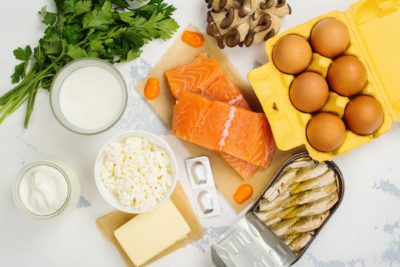To feel your best, you need to sustain a well-balanced diet, exercise, and get plenty of quality sleep. On the other hand, poor nutrition, a sedentary lifestyle, and lack of sleep can have detrimental side effects. You’ll know because your body has ways of letting you know.
body has ways of letting you know.
Here are 6 common signs that you might have a vitamin and mineral deficiency. If you are experiencing any of these symptoms or suspect you have a nutrient deficiency, see your doctor.
- Dry, brittle nails and hair. While generally rare, a biotin – or vitamin B7 – deficiency can cause brittle, splitting nails and hair, chronic fatigue, tingling in the hands and feet, and cramps. Those with digestive disorders like Crohn’s disease, heavy smokers and drinkers, and pregnant women are at the highest risk of developing a biotin deficiency. Some foods high in biotin are fish, meat, egg yolks, dairy, seeds, nuts, sweet potatoes, broccoli, and spinach.
- Cracks in the corner of the mouth and canker sores. While there are several causes of lesions in and around the mouth, one reason is an iron vitamin B deficiency. Balance your diet with more iron-rich foods such as meat, fish, poultry, dark leafy greens, and whole grains. To increase intake in riboflavin, thiamine, and pyridoxine, eat more eggs, dairy, legumes, nuts and seeds, as well as whole grains, meat, fish, and poultry.
- Sore, bleeding gums. If you’re sure you’re not being a little too rough with the toothbrush, a lack of vitamin C can be the cause of bleeding gums. Our bodies do not produce vitamin C on their own so the only way to maintain healthy levels is through food. Eating at least 2 pieces of fruit and 3-4 servings of veggies can ensure adequate levels of vitamin C.
- Poor night vision. A lack of vitamin A can lead to night vision problems and even white growths on the whites of your eyes. While vitamin A deficiency is rare, foods such as organic meats, eggs, dairy, orange and yellow veggies, fish, and dark leafy greens can help ensure adequate levels.
- Seborrheic dermatitis and dandruff. A nutrient-poor diet can lead to both skin conditions, including low levels of zinc and vitamins B3, B2, and B6. Consuming more meat, poultry, fish, eggs, dairy, whole grains, starchy and green vegetables, seeds and nuts can help reduce symptoms.
- Hair thinning and loss. Up to 50% of adults will experience hair loss by age 50. And while several factors can lead to thinning or loss, a diet lacking some key nutrients can slow hair growth and cause hair to thin or fall out. These include iron, zinc, linoleic acid, and vitamins B, B3, and B7. Again, consuming foods such as fish, poultry, meat, eggs, dairy, colorful fruits and vegetables, seeds, nuts, and whole grains can help strengthen hair.
When time doesn’t allow or your taste buds object, don’t go without vitamin intake- go the vitamin aisle in your local pharmacy and stock up. Take each as prescribed, and make sure you inform your primary care physician.
Is vitamin deficiency about your hair loss? That’s just one of many questions we can answer for you during a free pre-treatment consultation at the DiStefano Hair Restoration location nearest you. Why not schedule now!


